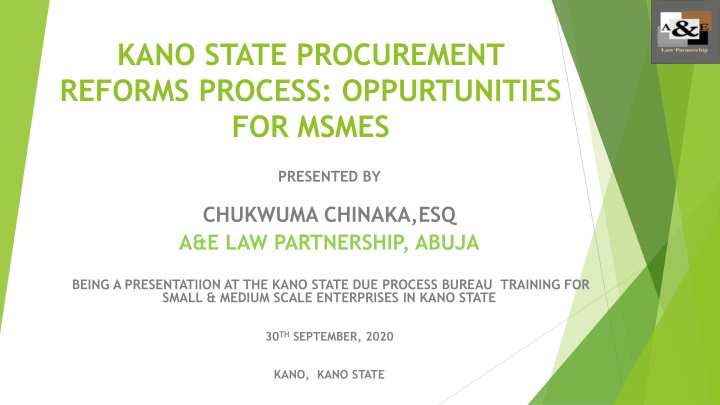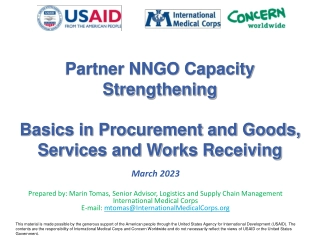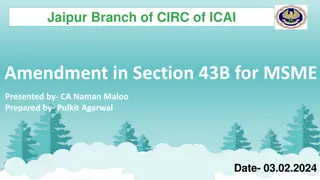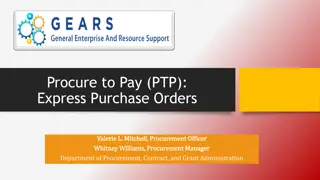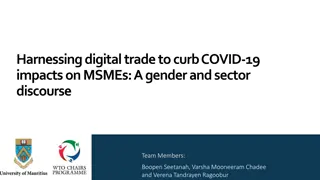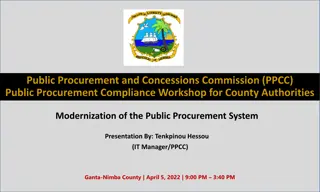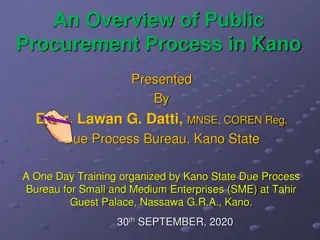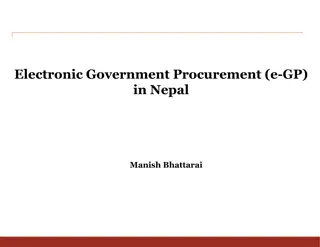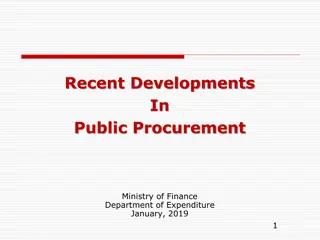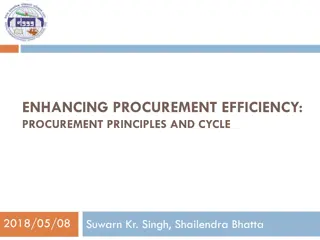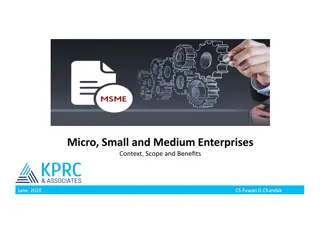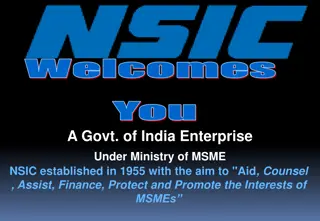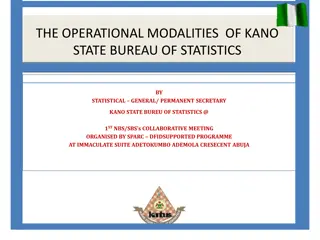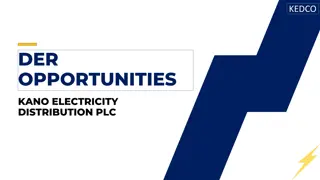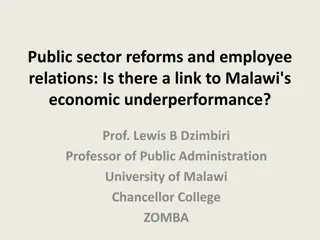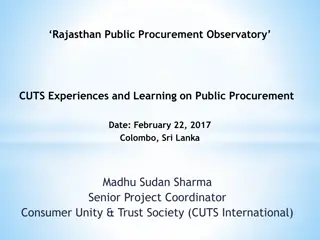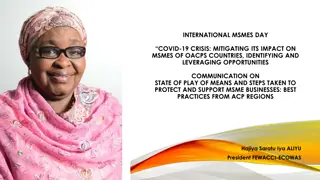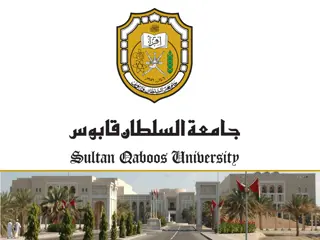Opportunities for MSMEs in Kano State Procurement Reforms
Delve into the significance of MSMEs in public procurement in Kano State, exploring key provisions, challenges, and recommendations for their involvement. Understand the background to procurement reforms, the impact of Covid-19, and the framework set by the Kano State Due Process Bureau.
Download Presentation

Please find below an Image/Link to download the presentation.
The content on the website is provided AS IS for your information and personal use only. It may not be sold, licensed, or shared on other websites without obtaining consent from the author.If you encounter any issues during the download, it is possible that the publisher has removed the file from their server.
You are allowed to download the files provided on this website for personal or commercial use, subject to the condition that they are used lawfully. All files are the property of their respective owners.
The content on the website is provided AS IS for your information and personal use only. It may not be sold, licensed, or shared on other websites without obtaining consent from the author.
E N D
Presentation Transcript
KANO STATE PROCUREMENT REFORMS PROCESS: OPPURTUNITIES FOR MSMES PRESENTED BY CHUKWUMA CHINAKA,ESQ A&E LAW PARTNERSHIP, ABUJA BEING A PRESENTATIION AT THE KANO STATE DUE PROCESS BUREAU TRAINING FOR SMALL & MEDIUM SCALE ENTERPRISES IN KANO STATE 30THSEPTEMBER, 2020 KANO, KANO STATE
TO BE DISCUSSED Background to procurement reforms Meaning of MSMEs Why MSMEs in Public Procurement? Definitions of Public Procurement Impact of Covid-19 on MSMEs Key provisions of the Kano State Procurement Manual Common Challenges faced by MSMEs in Public Procurement Principles of Public Procurement General Qualifications of Bidders Recommendations for MSMEs involvement in Public Procurement Grounds for Exclusion of Bids Conclusion
BACKGROUND TO PROCUREMENT REFORMS Governments delivers its mandate through the provision of goods, works and services through public procurement Sound procurement policies and practices are elements of good governance FGN/World Bank Report (CPAR) 2000 revealed that Nigeria lost about $10b annually to corruption through award of contract essential The Country Procurement Assessment The Federal Government set up the Budget Monitoring and Price Intelligence Unit in June 2003 as a fall out of the CPAR initiative and recommendations of the CPAR led to the enactment of the Public Procurement Act in 2007 Further implementation of the
BACKGROUND Cont.. Many states have enacted similar Laws to guide their procurement processes Kano State Public Procurement Bill is being considered by the Kano State House of Assembly (Second Reading Stage) The State Government set up the Kano State Due Process Bureau The Bureau has issued some procurement guiding tools in the State to ensure a transparent, competitive and efficient procurement system in the State Key amongst the tools is the Due Process Manual for Kano State and Local Government Procurement Services 2016 which stipulates the structures, principles and procedures for public procurement at the State and Local Governments The scope of the Manual includes procurement for goods, works and services; disposal of assets and public private partnership
DEFINITIONS OF PUBLIC PROCUREMENT FUNCTIONAL DEFINITION Procurement is defined as the acquisition of goods , Works and/or services at the BEST POSSIBLE TOTAL ownership, in Quantity and QUALITY at the RIGHT TIME, PLACE for the direct BENEFIT or use of Corporation or generally via a contract. - Wikipedia Encyclopedia PROCESS DEFINITION The goods, works and services, from the identification of need to contract administration and through the end of a services contract or the useful life of an asset. - Procurement Manual, Bureau of overall process of acquiring cost of the Right in the RIGHT Government, individuals, Management, Office of Legal and Procurement Support, Jan 2005
KEY PROVISIONS OF THE KANO STATE PROCUREMENT MANUAL Established Procurement Structures State Council on Public Procurement (State Executive Council) Tenders Board Ministerial Tenders Board Special Ministerial Tenders Board Resident Due Process Office Technical Evaluation Committees Similar structures exist at the Local Governments
KEY PROVISIONS Cont.. Requirements for due process in any bid process Assessment of bids Financial; Responsiveness; and Technical Due Process Compliance Review Requirements from MDAs after Award of Contract Special and Restrictive Tendering Processes Code of Conduct for Providers and Public Servants involved with the procurement process Creates Offences Suppliers, Contractors, Service
PRINCIPLES OF PUBLIC PROCUREMENT All procurements should be conducted : Based on procurement plans appropriations; Subject to thresholds and obtaining the Certificate of No Objection to award; Procurement to be conducted by open competitive bidding subject to exceptions; To be conducted in a transparent, timely and equitable manner; In a manner which promotes competition, economy and efficiency; Suppliers, contractors or service providers may be a natural person, a legal person or a combination of both Award to lowest evaluated responsive bid substantially responsive to the bid solicitation Contracts to contain warranties for durability of goods, exercise of requisite skills in service provision, use of genuine materials and inputs in contract documents To achieve value for money and fitness for purpose supported by prior budgetary
GENERAL QUALIFICATION OF BIDDERS Professional and technical qualifications; Financial capability; Equipment and other relevant infrastructure; Adequate personnel; Not be in receivership or any form of insolvency or bankruptcy proceedings or winding up proceedings; Fulfillment contributions; of tax obligations, pensions and social security Not have a director convicted in any country for fraud or financial impropriety etc.; Accompany every bid with an affidavit: Disclosing any pecuniary interest; and Confirming that all information in bid is true.
GROUNDS FOR EXCLUSION OF BIDS Verifiable evidence of offer or promise of a gift of money or any tangible item to influence procurement decisions or outcomes Failure to deliver past contracts (normally for past three preceding years) Being in receivership or subject of any type of insolvency proceedings or made compromises with creditors Being in arrears regarding payment of taxes, charges, pensions or social insurance contributions Validly sentenced for a crime related to procurement or to gain financial profit Bidder has in its management a person convicted, or the person partially owns the bidder Failure to submit a statement on dominating or subsidiary relationships
MEANING OF MICRO, SMALL & MEDIUM ENTERPRISES Enterprise Category Micro Small Medium SOURCE: www.boi.ng. Small and medium-sized enterprises (SMEs) are non-subsidiary, independent firms which employ fewer than a given number of employees. This number varies across countries Organization for Economic Co-operation and Development SME and Entrepreneurship Outlook: 2005, OECD Paris, page 17. Number of Employees 10 >11 50 > 51 200 Total Asset (N Million) 5 > 5 100 > 100 500 Annual Turnover (N Million) 20 100 500 Loan Amounts (N Million) 10 >10 100 >100 500 Small and medium-sized enterprises (SMEs) or small and medium-sized businesses (SMBs) are businesses whose personnel numbers fall below certain limits. SMEs are also said to be responsible for driving innovation and competition in many economic sectors. The CEOs of SMEs often are the founders, owners, and manager of the SMEs - WIKIPEDIA
WHY MSMES IN PUBLIC PROCUREMENT? Nigeria s GDP in 2019 estimated at $448.10 Billion. SMEs account for : 48% of Nigeria s Gross Domestic Product; 96% of Nigeria s businesses; 84% of employment in Nigeria; and 7.2% of goods and services exported out of Nigeria States with the largest SMEs in Nigeria are: Lagos: 3,224,324; Oyo: 1,864,054; and Kano: 1,794,358 Source: Nigeria SME Contribution to the GDP in 2019 by Ijeoma Onyinyechukwu, August 26 2020,www.sme360.ng accessed 29thSeptember, 2020. With the above indices, the roles of MSMEs in the economy is tremendous and in view of the threat posed by Covid -19, should they be allowed become extinct or encouraged?
IMPACT OF COVID-19 ON MSMEs FATE Foundation in partnership with BudgIT Nigeria analysed 1,943 MSMEs in the 36 States and FCT Results from the analyses showed that 94.3% of the business negatively in the areas of cash flow, sales and revenue Source: Nigerian MSMEs Impact of Covid-19 by Victor Enengedi on 14thJune, 2020 at www.nairametrics.com, accessed on 29thSeptember, 2020 were impacted Suffer Negative
COMMON CHALLENGES FACED BY MSMES IN PUBLIC PROCUREMENT Lack of knowledge on oppurtunities in public procurement; Lack of trust in the public procurement system and processes; Non-competiveness of SMEs; Failure of MSMEs to meet statutory eligibility requirements e.g. registration, tax and social security obligations, adequate technical personnel etc.; Poor capital base of MSMEs; Poor technology infrastructure and skill gaps; Non-collaboration of MSMEs inorder to participate in the procurement processes; Poor patronage and incentives by public authorities; Excessive bureaucratic procedures and processes in procurement proceedings; and Poor completion or outright abandonment of past projects by MSMEs etc.
RECOMMENDATIONS FOR MSMEs INVOLVEMENT Periodic trainings, workshops and other capacity building exercises for MSMES on the procurement system, processes and procedures; All procurement oppurtunities in procuring entities should be forwarded to the Due Process Bureau for publication on its website, and may as well be forwarded to the MSMEs body in the State for publication; Waiver of some tax, social security and other eligibility requirements; Procuring entities may breakdown procurement packages into lots of qualitative and quantitative terms particularly for non-complex projects to enable SMEs meet minimum requirements e.g. cash flow/turn over, relevant experience etc.; Procuring entities should encourage in the standard bidding documents and other solicitation documents the formation of joint ventures and sub-contracting arrangements by MSMEs to deliver specific projects; Procuring entities should encourage free download of bidding documents from their respective websites; If payments are to be made for bid or solicitation documents, it should not exceed the cost of printing and other necessary incidentals
Recommendations Cont Deployment of technology to reduce cost, time and excessive physical interface should be encouraged e.g. electronic bid submissions of password protected, read-only quotation; bids and Waiver of some financial instruments such as bid security, advance payment and performance guaranties for specific projects or for higher monetary threshold projects; Submission of performance bond, advance payment and bid security declarations in place of bank or insurance instruments; Advance payments may be reviewed slightly upwards; must build on capacities; MSMEs their institutional structures and
Recommendations Cont Procuring entities should use the standard bidding documents to encourage local content, transfer of technology and use of local skills where available; Award criteria should reflect local circumstances especially for non- complex projects for skills and resources are available e.g. use of domestic resources, women participation, local economic impacts, environmental issues etc.; Drawing down on excessive bureaucratic bottlenecks in procurement proceedings e.g. double registrations at Due Process Bureau and the procuring entities; Projects set asides especially where it is established that the skills and resources for such projects abound; Government should sensitize and guide MSMEs on how to access finance, especially the CBN SMEs Intervention Fund; MSMEs Support Scheme under the National Economic Sustainability Programme amongst others.
CONCLUSION Government resources are scare and must be judiciously expended for the common good and in the public interest; Hence, for MSMEs to effectively implement government procurement, they must be competitive; The potentials of MSMEs in Kano State s economic activities could be harnessed optimally through deliberate , constructive and decisive public procurement instruments, processes and procedures ; To be and remain competitive by MSMEs is a joint task that must be accomplished with the Government; and Transparency, efficiency, competition shall be enthroned to attain value-for-money and fitness for purpose in all procurement proceedings , while punishments must be meted out as deterrent to people that may attempt to or subvert laid down procedures. Thank you for listening.
